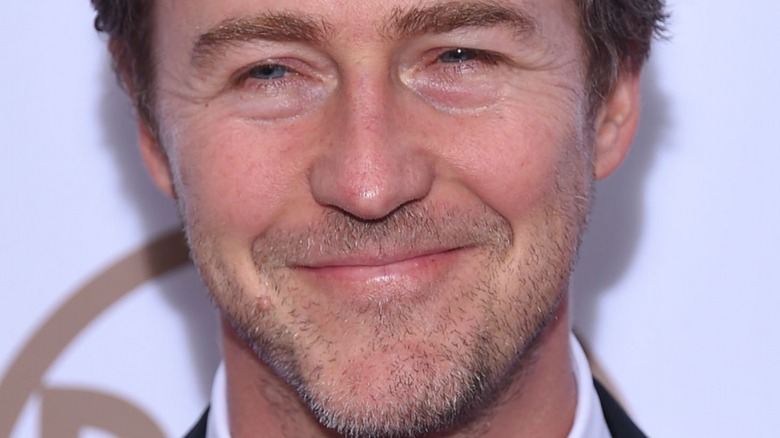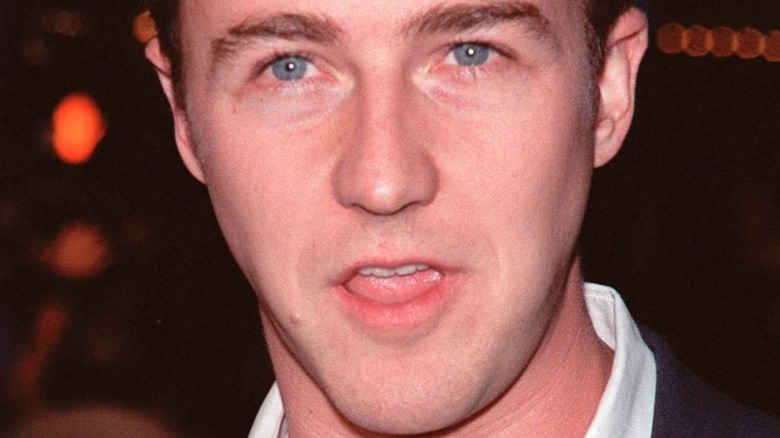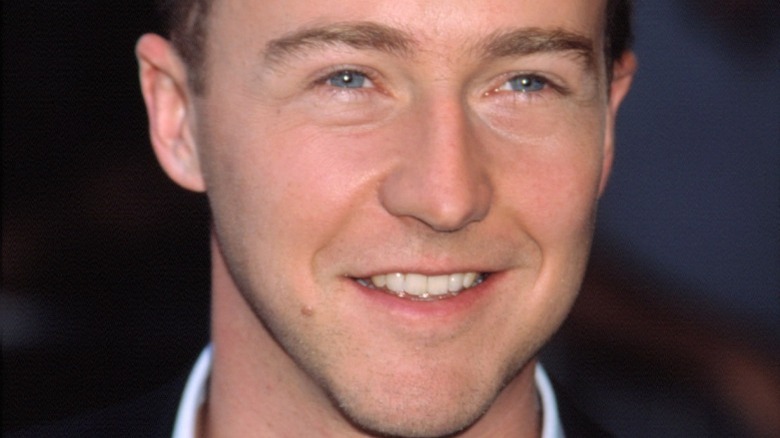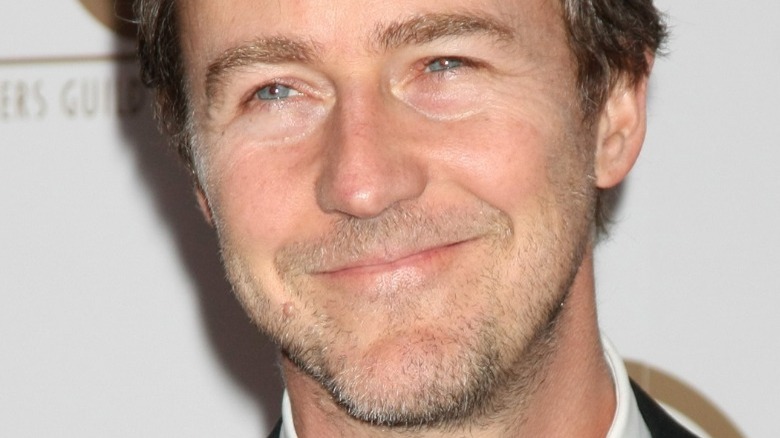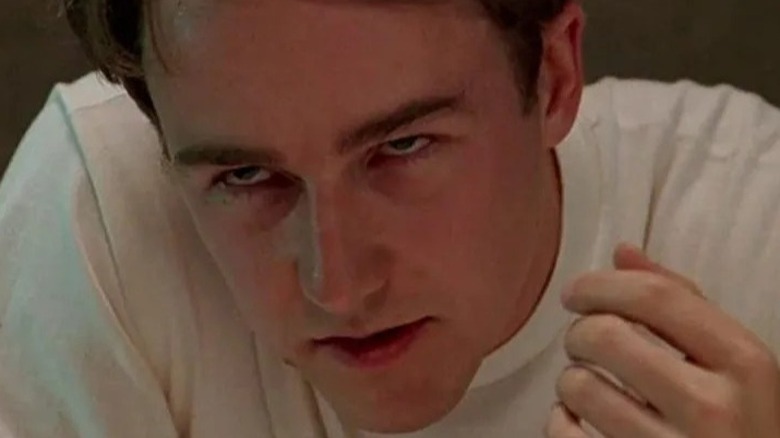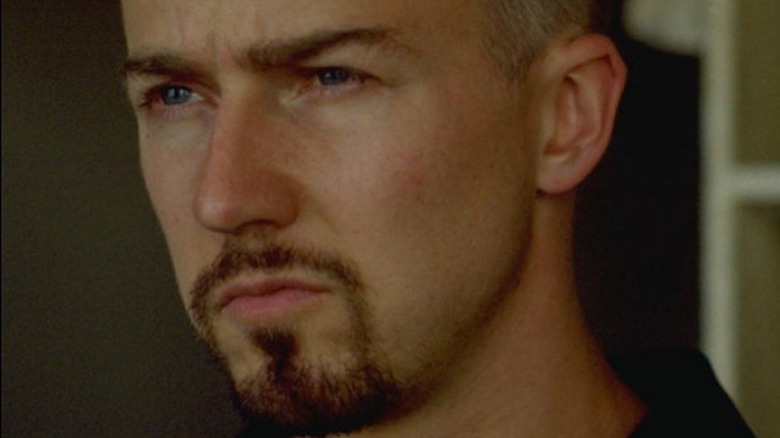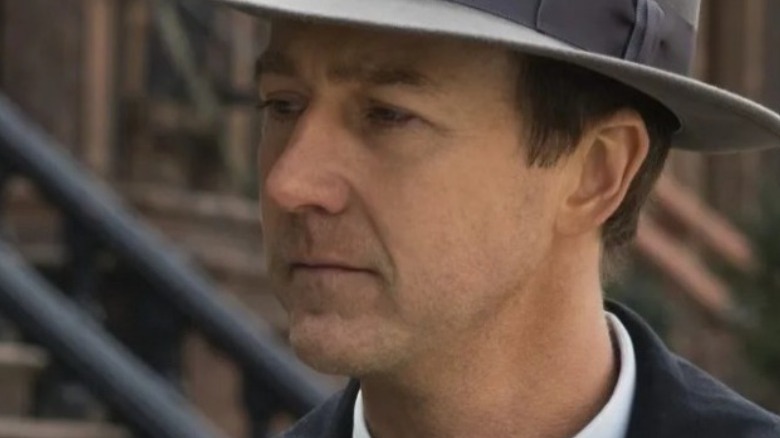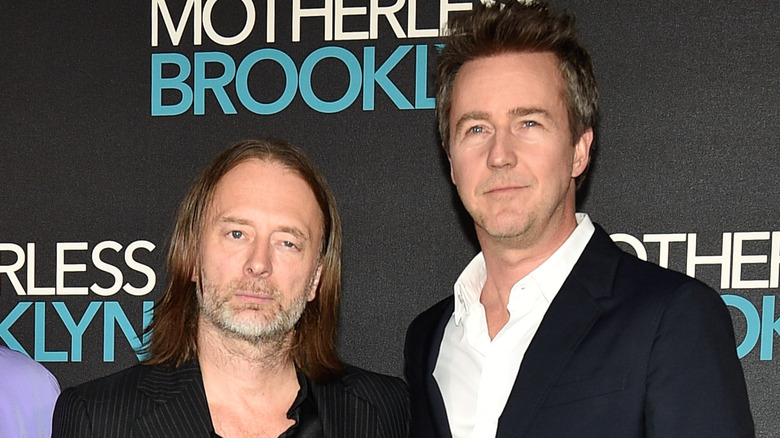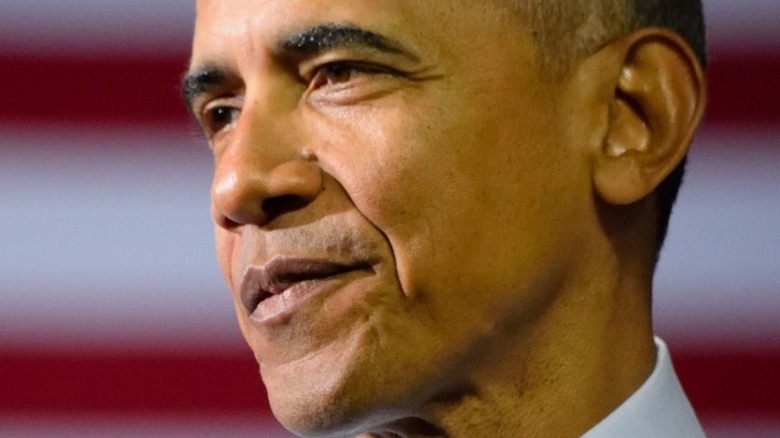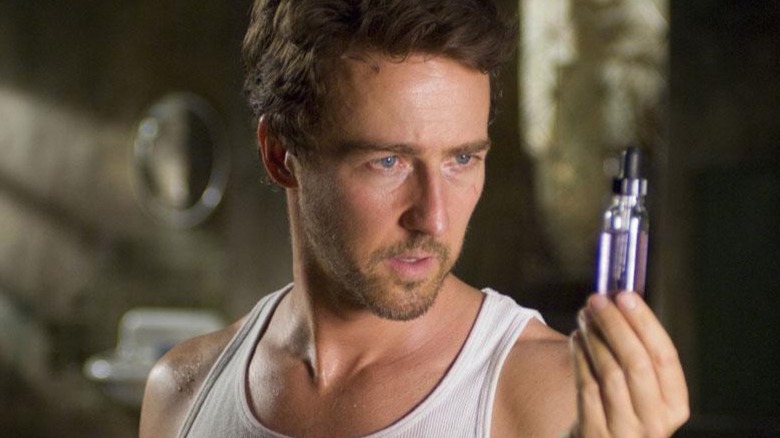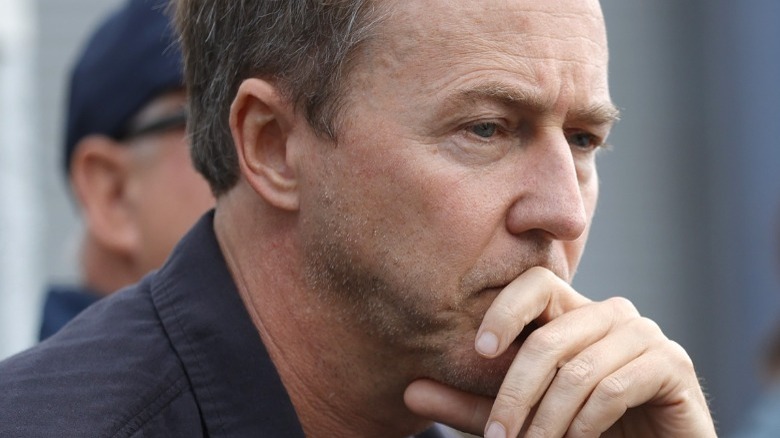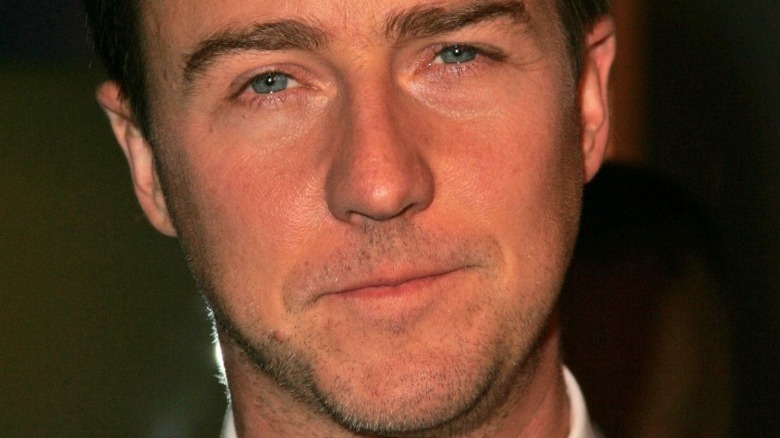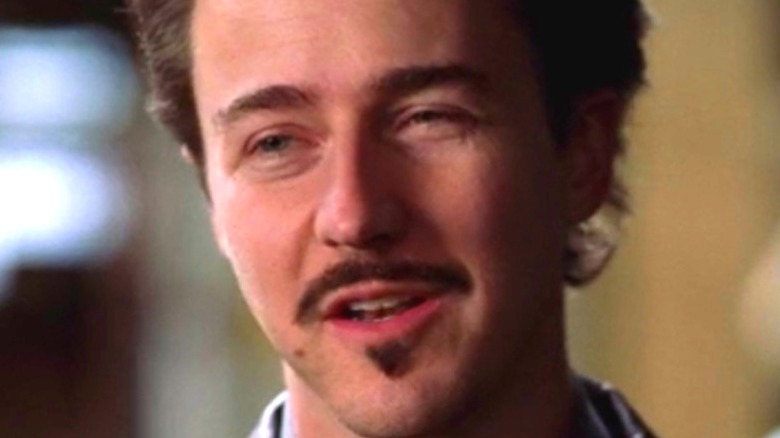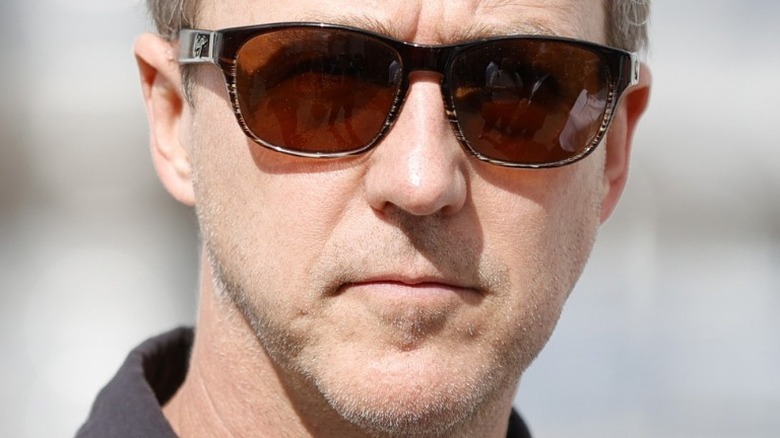The Untold Truth Of Edward Norton
Edward Norton has oozed talent since his professional acting debut, prompting Vanity Fair to call him "the finest actor of his generation" way back in 1999 and causing some to dub him "the next DeNiro." Norton's first Hollywood role came in 1996 when he snagged the lead in the thriller, "Primal Fear." In childhood, he acted in local theater productions for Toby Orenstein–a storied East Coast theater producer, and after he graduated from college, Norton studied with legendary New York City acting coach, Terry Schreiber. He knew he wanted to pursue acting professionally, but had yet to break into television or film. At the age of 26, Norton scored the lead, opposite Richard Gere, in "Primal Fear."
In the film, Norton's turn as Aaron Stampler (a troubled teen murderer with purported split personalities) caused audiences and critics alike take notice of his obvious talent: For instance, Variety called Norton's debut performance "stand out." In 1997, the part earned Norton his first Academy Award nomination for best supporting actor. In the years since, he has developed a reputation as a perfectionist who can prove difficult to work alongside. However, Norton's impressive Hollywood resume continues to grow. Let's take a look at some interesting facts about Edward Norton.
Grew up in planned community designed by his grandfather
Born on August 18, 1969, Edward Norton spent his formative years in Columbia, Maryland, a planned community sandwiched between Baltimore, Maryland and Washington, D.C. Columbia was founded by progressive architect, James Rouse – Norton's maternal grandfather. Columbia frequently ranks on "best places to live" compilations, landing in the top spot on Money's 2016 list and coming in at number two on WalletHub's "Happiest Places to Live" in 2022. Norton recalled growing up in Columbia as the grandson of Rouse for Baltimore Magazine. The actor reflected, "It certainly wasn't negative. (My grandfather) was beloved. He was seen as this person who had success on a national level but who had stayed at home and committed to his hometown."
Norton attended public school in Columbia, graduating from Wilde Lake High School in 1987, where, according to the same Baltimore Magazine piece, he didn't publicize his interest in acting. The magazine interviewed high school friends of the actor who recalled an intelligent, academically-focused, quietly popular teenage Norton. Norton's mother, Lydia Robinson "Robin" Norton, was a beloved high school English teacher. She later worked as an education program officer for the non-profit Abell Foundation, an advocacy health and educational foundation located in Baltimore City. His father, Edward Mower Norton Jr., founded the Conservation Lands Foundation, and was a federal prosecutor with the Maryland U.S. State's Attorney office.
Edward Norton graduated from Yale with a history degree
Although Edward Norton began acting at an early age, he didn't choose to pursue the craft professionally until after he graduated from college. However, he still found time to participate in theater productions during his years at Yale, performing with castmates and future Hollywood actors like Paul Giamatti and Ron Livingston, and has since returned to his alma mater to speak to film students. As reported by the Yale Alumni Spotlight, in a workshop with Yale theater students, Norton discussed the necessity of plunging into roles and taking a sponge-like approach to new parts.
During his undergraduate years, Norton focused on academics and was also a member of the Yale crew team. He graduated from Yale in 1991 with a Bachelor of Arts in History. In 1996, the actor told the Baltimore Sun, "I don't like to play up the Yale thing because if they find out you went to Yale and came from a certain kind of family, then you're stuck. I have found it's an industry to pigeonhole you." Norton also told the Yale Alumni Spotlight that his Yale friendships were some of the longest and deepest bonds of his life. The intellect that secured Norton a spot in the Ivy League shines through in the thoughtful depth he brings to each acting role.
He speaks fluent Japanese and lived in Japan
While Edward Norton was at Yale, he also studied Japanese, becoming fluent in the language. His grandfather, James Rouse, had established a branch of his non-profit, community-building Enterprise Foundation (now known as Enterprise Community Partners) in Osaka, Japan, and Norton briefly came to live and work alongside him on a project at the Osaka aquarium. According to the Japan Times, Norton wowed the Japanese press when promoting his directorial debut "Keeping the Faith" in 2000. The actor gave a press conference in Japanese and told the gathered reporters, "I was in Osaka 10 years ago working for an aquarium on the bay." Norton went on to joke with reporters about his favorite singer to emulate in karaoke, saying, "Mostly Billy Joel."
Upon Norton's return stateside in the early '90s, he decided to take the plunge into a full-time pursuit of acting, and moved to New York City, where he still lives today. He hasn't forgotten his time in Japan, though: After a tsunami and earthquake wreaked havoc on Osaka in 2010, Norton took to Twitter to express his solidarity with the citizens of his former Japanese home. He shared in Japanese, "I lived in Osaka, Japan in 1990 and have many friends there. Sending love and support to all Nihonjin brothers and sisters.Ganbatte!" Nihonjin means Japanese people, while Ganbatte translates roughly from Japanese to English as "do your best!"
Norton saved Primal Fear after Leonardo DiCaprio bailed
"Primal Fear" launched Edward Norton's Hollywood career in a huge way — he was nominated for an Academy Award after his first role. However, Norton almost missed the opportunity to play the part that showcased his wealth of acting talent. The actor hadn't achieved name recognition yet, and "Primal Fear" was set to be an A-list film.
In an interview with Yahoo Entertainment, Norton recalled that Leonardo DiCaprio was initially offered the role of Aaron Stampler, but found the script problematic and passed. Norton discussed the serendipitous way he wound up auditioning for the part, too. He stated, "I heard about it from Connie Britton ... She went to a pay phone and called me and said, 'They're seeing people for this role and I have the spookiest feeling it's made for you.'"
Per the Daily Actor, Norton remembered his audition process for the film–it included sending a fax to famed casting director, Deborah Aquila. Norton said, "She was seeing thousands and thousands of people for that part ... It started to kind of focus on me." Alas, Connie Britton did not end up in "Primal Fear," but she went on to star in hit television shows like "Friday Night Lights" and "9-1-1." If DiCaprio hadn't passed on the film, would Norton have landed his parts in "American History X," "Fight Club," and other legendary movies?
He edited the final cut of American History X
If "Primal Fear" put Edward Norton on the acting map, "American History X" (1998) proved he belonged there. Norton's role as Derek Vinyard earned the actor his second Academy Award nomination, and his first nod for best actor. In the film, Derek Vinyard is a reformed neo-Nazi skinhead who tries to extricate his younger brother Danny (Edward Furlong) from the white supremacist movement. Norton's performance exudes layered nuance and believability. While Vinyard's actions as a skinhead are deplorable, Norton plays him in a way that gives insight into how Vinyard was indoctrinated into neo-Nazism. However, behind-the-scenes, Norton butted heads with "American History X" director, Tony Kaye.
As Kaye told The Guardian, Kaye hated the theatrical release of "American History X," and did not have final say on the end product. New Line Cinema gave Norton, a relative newcomer to Hollywood and an actor without a directing credit to his name, access to the editing room and allowed him to oversee the final cut of the film. Kaye then took out full-page ads in industry publications to hurl insults at both then-New Line head honcho Michael De Luca and Norton. The director wanted his name erased from the film. Unfortunately for Kaye, the film received critical praise.
Norton co-founded Class 5 Films
Less than a decade after Edward Norton hit the big screen, he established his own film production company. Along with his best friend from Yale, Stuart Blumberg and producer Bill Migliore, Norton formed Class 5 Films in 2003. The company has produced the 2006 period drama "The Painted Veil" and the 2019 Norton-helmed crime drama "Motherless Brooklyn" (both of which starred Norton), among other projects. Much like Norton himself, Class 5 eschews promotional publicity — the company continues to release films every few years, but doesn't even have a public website.
Unfortunately, as documented by Variety, the production company became entangled in mounting legal issues after the filming of "Motherless Brooklyn." In March 2018, a fire broke out in St. Nick's, a closed Harlem pub where the film was shooting. A New York City firefighter, Lieutenant Michael Davidson, died as a result of the blaze, and the historic building was destroyed. Davidson's widow, along with tenants of the building where the pub was located, filed lawsuits against Class 5, alleging that the company was legally responsible for the fire. However, the New York Daily News notes that the building itself was not up to fire regulations and code, and the building's owner, Vincent Lampkin, faced numerous citations for violations dating back to 2011. Lampkin has been accused of failing to provide a working sprinkler system or boiler. Regardless of the outcome of the lawsuits, the day was a tragic one for all involved.
He's good friends with Thom Yorke
For the film "Motherless Brooklyn" — Edward Norton's passion project which he starred in, wrote, and directed — the actor turned to Radiohead's Thom Yorke to help build the soundtrack. In an interview with Rolling Stone, Norton disclosed his nervousness in reaching out to Yorke, saying, "There's a certain risk in making a bid to work with people that you love and admire ... The last thing you want is to get at loggerheads about something you care a lot about and you invite someone you care [about] and love in and it's not working."
The two have a friendship dating back to the 1990s, meeting as Norton's acting career took off and Radiohead's success in the music world soared to new heights. The Guardian conducted an interview with Norton and Yorke, during wich the actor recalled that he and Brad Pitt constantly listened to "The Bends" and "OK Computer" while on the set of "Fight Club." In fact, Yorke was originally slated to write the "Fight Club" soundtrack. Both Yorke and Norton explore experimental artistic approaches to their respective crafts, and Norton has long held Yorke's music in high regard. Norton went on to explain to The Guardian that the Radiohead frontman is his "Billie Holiday."
He produced a documentary on Barack Obama
Before Barack Obama announced his presidential campaign, Edward Norton planned a documentary about the senator's eventual run for President. By 2006, Obama had begun contemplating tossing his hat in the presidential ring, but had not yet publicly declared entering the race. The inception of "By the People: The Election of Barack Obama" (which originally aired on HBO in 2009), came from cinematographer, Amy Rice, who began following Obama's rise to the Senate in 2004. Rice approached Norton about funding behind-the-scenes footage of the compelling Senator, and Norton agreed.
In 2006, Rice captured Obama both on the campaign trail and on a trip to Africa. Norton agreed to a deal with HBO to show the feature-length documentary, which marks many historical moments for Obama. In 2012, Norton and director Bennett Miller collaborated on "We Hold These Truths," a short documentary endorsing Obama's second term and focusing on citizens who voted for him. At the time, Norton told BuzzFeed, "Even though I support the President, to me it's much more interesting to encourage people to engage than to suggest that people should model themselves on me and my views." "We Hold These Truths" was a refreshing departure from political endorsements that place the focus on a celebrity.
The truth behind the Hulk
After Eric Bana portrayed Bruce Banner on the silver screen in the 2003 film "Hulk," he revealed his frustration at the role, and was not asked to portray the green beast again. On Marc Maron's podcast, "WTF With Marc Maron," Bana said, "It just wasn't the type of film that I saw myself doing." Marvel needed to find a replacement for the reluctant superhero for future "The Avengers" films. Enter Edward Norton. Five years after Bana's attempt, Norton played Bruce Banner in 2008's "The Incredible Hulk."
However, as Bana before him, Norton only played the Hulk once before getting fired. Mark Ruffalo replaced him, and rumors of drama between Marvel and Norton surfaced. Norton wanted a sequel along the lines of the Christopher Nolan "Batman" trilogy — dark and deep. He told the New York Times, "Ultimately they weren't going for long, dark and serious. But it doesn't matter ... We looked at the amount of time that would've taken, and I wasn't going to do that." Norton also explained that in spite of rumors to the contrary, he got along well with president of Marvel Studios, Kevin Feige.
He's a trustee of Enterprise Community Partners
In his spare time, Edward Norton gives back to the community via causes he is passionate about, including the affordable low-income housing provided by his grandfather's foundation, Enterprise Community Partners. Norton has been a lifetime trustee on the board of Enterprise since 1998. Enterprise began its operations serving urban communities in both Baltimore, Maryland and Washington, D.C., and has grown exponentially. Fast Company reported on Norton's active Enterprise involvement, noting that his first position as a college grad was with the family company. The website also noted that as a representative of the company, Norton testified before the House Select Committee on Energy Independence and Global Warming. The company also unveiled a $9 billion affordable housing project involving the actor.
Currently, Enterprise Community Partners boasts branches in all 50 states. Per the "Our Impact" page of the foundation's website, the company has invested a staggering $54 billion in local communities and helped to build 873,000 homes. The foundation also calls racial equity "the center of our work" and strives to help end systemic racism through policy work and advocacy. James Rouse began the foundation with his wife, Patty in 1982. Norton continues to lend his name and passion to the group, and Enterprise shows no signs of folding anytime soon.
Norton is the U.S. President of Maasai Wilderness Conservation Trust
Along with his passion for social advocacy and racial equity, Edward Norton also raises public awareness for environmental causes. In an interview with Uncharted (formerly Outside Go), Norton discussed meeting Maasai Wilderness Conservation Trust founders Luca Belpietro and Samson Parashina in Kenya. The two shared their vision of creating sustainable, thriving economies and ecosystems for the Maasai people with Norton, and he was impressed by their actionable plans. Norton has served as the U.S. president of the Maasai Wilderness Conservation Trust for over a decade.
Per the organization's About Us page, its mission is "to protect the legendary ecosystems and astounding biodiversity of East Africa through conservation that directly benefits local Maasai communities." The conservation partners with wildlife advocates throughout the world and works to help the Maasai people to thrive. Norton also serves as a WildAid ambassador for elephants, filming several PSA-type ads for the pachyderms. He has also held the role of United Nations Goodwill Ambassador for Biodiversity since 2010.
He reluctantly took role in The Italian Job
Rumors of Edward Norton's difficult behavior resurfaced with "The Italian Job." The crime-heist film–a 2003 remake of the 1969 film starring Michael Caine also included an impressive cast: Caine himself, Charlize Theron, and Mark Wahlberg were among Norton's stellar co-stars. "The Italian Job" fared well at the global box office. However, Norton hadn't wanted to take his role in the film in the first place, and at the time of filming, was involved in a messy contract dispute (per The Observer) with Sherry Lansing, then head of Paramount Pictures.
Norton's contract with Paramount began with "Primal Fear" and obligated the actor to star in two future Paramount pictures–one for $75,000 and the next for $125,000. Not a bad payday for a fledgling actor. However, Norton's star power and ability to carry a film quickly exploded — by 2003, he'd nabbed two Academy Award nods. The actor and Lansing were unable to agree on future Paramount projects. Norton fulfilled his contract obligation by taking the role of the slick, villainous criminal mastermind, Steve, in the film. Lansing completely stepped away from Hollywood in 2005.
Edward Norton shies away from celebrity culture
Edward Norton doesn't live in the glaring celebrity spotlight, and prefers to keep his personal life private. Norton is married to Shauna Robertson, a film producer who worked with Judd Apatow on a plethora of hits. However, Robertson's work keeps her mostly behind the camera, and the couple doesn't land in the gossip rags. Norton is dedicated to the craft of acting, but could deal without celebrity culture.
In an interview with GQ, Norton spoke about the public need for actors to have yearly projects, whereas musicians aren't questioned for taking extended breaks. He said, "I think it has to do with the unfortunate overlay between what I would call 'celebrity' culture — and the expectation, especially in the social-media age of, literally, omnipresence, literally no break from presence ... And I think the expectations are derived from a very inauthentic place, or a place that I think is fairly antagonistic to the values of really powerful performance. I was very affected by the example of other actors I admired who ... maintained a certain sense of elusiveness that, to me, greatly enhanced the impact of their work."
